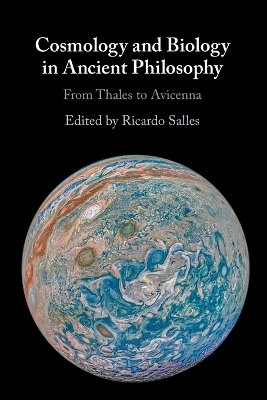
Cosmology and Biology in Ancient Philosophy
Cambridge University Press (Verlag)
978-1-108-81259-7 (ISBN)
In antiquity living beings are inextricably linked to the cosmos as a whole. Ancient biology and cosmology depend upon one another and therefore a complete understanding of one requires a full account of the other. This volume addresses many philosophical issues that arise from this double relation. Does the cosmos have a soul of its own? Why? Is either of these two disciplines more basic than the other, or are they at the same explanatory level? What is the relationship between living things and the cosmos as a whole? If the cosmos is an animate intelligent being, what is the nature of its thoughts and actions? How do these relate to our own thoughts and actions? Do they pose a threat to our autonomy as subjects and agents? And what is the place of zoogony in cosmogony? A distinguished international team of contributors provides original essays discussing these questions.
Ricardo Salles is a researcher at the Instituto de Investigaciones Filosóficas of the Universidad Nacional Autónoma de México. His recent books include: Los Filósofos Estoicos. Ontología, Lógica, Física y Ética (with Marcelo Boeri, 2014) and Alejandro de Afrodisias. De la Mixtura y el Crecimiento (with José Molina, 2020). He is the editor of Metaphysics, Soul and Ethics. Themes from the Work of Richard Sorabji (2005) and of God and Cosmos in Stoicism (2009).
Introduction. The intersection of biology and cosmology in ancient philosophy Ricardo Salles; 1. Souls and cosmos before Plato: five short doxographical studies André Laks; 2. The ensouled cosmos in Plato's Timaeus: biological science as a guide to cosmology? Barbara Sattler; 3. Platonic 'desmology' and the body of the World Animal (Tim. 30c-34a) Dimitri el Murr; 4. The world-soul takes command. The doctrine of the world-soul in the Epinomis of Philip of Opus and in the Academy of Polemon John Dillon; 5. Begotten and made: creation as cosmogony in Middle Platonism George Boys-Stones; 6. The De Motu Animalium on the movement of the heavens John M. Cooper; 7. Biology and cosmology in Aristotle James G. Lennox; 8. Recapitulation theory and transcendental morphology in antiquity James Wilberding; 9. The Stoics' empiricist model of divine thought George Boys-Stones; 10. Why is the cosmos intelligent? Stoic cosmology and Plato, Timaeus 30a2-c1 Ricardo Salles; 11. Cardiology and cosmology in post-Chrysippean Stoicism Emmanuele Vimercati; 12. The agency of the world Katja Maria Vogt; 13. God and the material world: biology and cosmology in Galen's physiology R. J. Hankinson; 14. At the intersection of cosmology and biology: Plotinus on nature Lloyd P. Gerson; 15. Is the heaven an animal? Avicenna's celestial psychology between cosmology and biology Tomasso Alpina.
| Erscheinungsdatum | 20.03.2023 |
|---|---|
| Zusatzinfo | Worked examples or Exercises |
| Verlagsort | Cambridge |
| Sprache | englisch |
| Maße | 152 x 229 mm |
| Gewicht | 470 g |
| Themenwelt | Geisteswissenschaften ► Philosophie ► Philosophie Altertum / Antike |
| Naturwissenschaften ► Physik / Astronomie ► Astronomie / Astrophysik | |
| ISBN-10 | 1-108-81259-7 / 1108812597 |
| ISBN-13 | 978-1-108-81259-7 / 9781108812597 |
| Zustand | Neuware |
| Haben Sie eine Frage zum Produkt? |
aus dem Bereich


